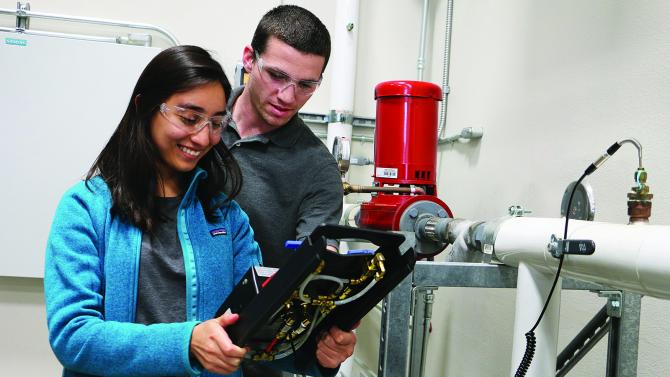Materials Engineering
College of Engineering
Everything around you is made of various materials – from rockets and computer chips, to electric vehicles and biomedical devices. For every product and technology that is made, materials engineers designed, selected and tested the materials used in its creation.
San Luis Obispo, California
The materials engineering curriculum has received national recognition for its innovative structure. Courses provide a breadth of understanding of science and basic engineering as well as an emphasis on practical materials engineering applications and principles.
Materials engineering labs use state-of-the-art instruments and testing equipment found in industry. Equipment includes an environmental scanning electron microscope, x-ray diffractometer, hardness testers, heat treatment labs and more.
Materials engineering majors are able to participate in a blended program where you can earn your bachelor's and master's degrees at the same time.
There are three blended programs available to materials engineering students and requirements are different for each program:
BS in Materials Engineering and MS in Biomedical Engineering
BS in Materials Engineering and MS in Industrial Engineering
About the Program

A degree in materials engineering will teach you what materials should be used to create products and how to develop new materials to fit new and specific purposes.
You will spend much of your time analyzing materials in labs with state-of-the-art instruments and testing equipment. There are also opportunities available for advanced research work as well as internships and co-ops with industry partners across California and the nation. This program is the only primarily undergraduate materials engineering program in the country and is accredited by the Engineering Accreditation Commission of ABET.
Learn by Doing
Through labs and real-world opportunities, you will learn the properties of various materials and how to work with them. You will polish metal to expose the structure of its atoms under an optical microscope. You'll use infrared radiation to explore the molecular structure of plastics and learn why it behaves the way it does. You'll test metals, polymers and composites under loads to measure their mechanical properties like stiffness and strength.

Create Safer Water
Our Graduates
Materials engineers contribute their expertise in virtually all areas of technology and will be needed to design uses for new materials in both traditional and emerging industries.
The majority of our graduates find employment in the biomedical, electronic, aerospace and petroleum industries as executives, consultants, or in research and development. Other graduates are entrepreneurs who have started their own consulting or manufacturing companies.
